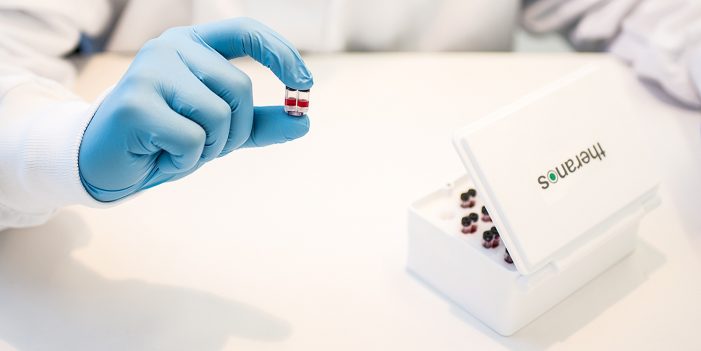
Elizabeth Holmes was once seen as a revolutionary female genius who graced the cover of magazines such as Forbes and Bloomberg Businessweek. She was Glamour magazine’s “Woman of the Year” in 2015. An Inc. Magazine cover featuring Holmes called her “The Next Steve Jobs.” Headlines boasted of her rise to fame and fortune in Silicon Valley after she dropped out of Stanford and went on to create a biotech startup company known as Theranos.
Her legacy was a machine she called the “Edison,” which she claimed was a blood testing revolution that had the ability to run numerous medical tests and improve health from a single finger prick and a few drops of blood.1 At the peak of Holmes’ influence, Theranos was worth an estimated $9 billion with investors such as Walgreens, former Secretaries of State, and corporate executives.2
Theranos Voids Thousands of Tests, Holmes Charged on Four Counts of Fraud
But the Theranos empire came crashing down almost as quickly as it had been built. The Wall Street Journal first published an investigation into the claims of Theranos in October 2015 that outlined the company’s struggle with inaccurate results, company transparency, and employee’s leeriness about the company’s claims.3
Theranos responded that the reports were “factually and scientifically erroneous.” However, the next day Theranos halted the use of its blood-collection vials and, soon after, changed its board of directors. After the company had several failed lab tests, Theranos voided two years of blood tests and investors begin suing. Eventually, Theranos was dissolved.
In 2018, Holmes was charged with massive fraud and indicted on criminal charges. Her criminal trial began in December 2021 and, earlier this month, she was found guilty on four charges of fraud that will likely result in prison time that could be up to 20 years.4
Theranos’ Inaccurate Blood Tests Resulted in False Health Alarms
Holmes didn’t just fool investors. In the few years that her breakthrough health tech product went largely unchecked, over 1.5 million Theranos blood tests were sold. 5 The results gave both patients and their healthcare providers misleading blood report information. Patients changed their medications, received false alarms of sometimes life-threatening diagnoses, or had serious health conditions that went undiagnosed because of the false claims by Theranos.4
The faulty Theranos blood tests led one patient to believe she was miscarrying when in fact she was not, and another got a false positive HIV test.5 One patient who utilized Theranos services was told she had excessive high levels of the hormone estradiol post-menopause, which she was told likely indicated cancer; several diabetic patients A1C levels were misdiagnosed, and some patients were even told to get off life-saving medications, such as Warfarin, which helps to clot blood.6
After the company began getting pressure from the press regarding inaccuracy of test results, in 2016 Theranos told federal regulators that it voided two year’s-worth of blood results. The company said it then “issued tens of thousands of corrected results to doctors and patients.”7
Theranos Technology Faulty from the Start, Never Externally Tested
Walgreens brought the Edison into its stores for patients to utilize without testing and validating the technology8 and the U.S. Food and Drug Administration (FDA) approved Theranos for herpes testing despite the product never having been validated or externally vetted.9
As Vox reports: “[Holmes] wasn’t building a health science startup. She was building a religious cult, completely divorced from medical evidence.”9
Theranos Lies Exposed by Media
While many in the media and public were eager to romanticize the rise of a young, female, self-made billionaire in Silicon Valley, the ultimate downfall of Elizabeth Holmes is in large part thanks to whistleblower employees and the few media skeptics who investigated further. As reporter Evan Nierman from The Hill writes:
The media can build you up, but it can also take you down—and dedicated, skeptical journalists made the difference in this case, shining a light on this company’s shortcomings as far back as 2015.
Nierman continues, “While the world was suckered by the false promise of Theranos, reporters set in motion a chain of events that led to the catastrophic meltdown of a company that was a house of cards built upon a lie.”2
Justifying Immoral Actions for a Noble Cause
Holmes maintains that she genuinely believed in her cause, as did many of her investors and much of the media. Holmes stated that her invention was going to revolutionize medicine and save lives. In a 2014 TED talk, Holmes promised “a world in which no one ever has to say goodbye too soon.”10
Many reporters have chimed in on the psychological and behavioral component of the Holmes saga, attempting to explain the fact that many people didn’t believe what she did was a lie because of her ability to rationalize her actions for good. One article written in Foundations for Economic Education described this as cognitive dissonance.
“If people fervently believe their cause is good, they are going to be more inclined to dismiss realities that conflict with their ideas or interfere with the realization of their goals.” The article continues, “If it’s being done for a noble enough reason, humans are less likely to feel tension over an immoral action and more likely to rationalize it. They’ll also be less likely to see evidence that shows their idea is not working.”11
If you would like to receive an e-mail notice of the most recent articles published in The Vaccine Reaction each week, click here.
Click here to view References:
No comments:
Post a Comment